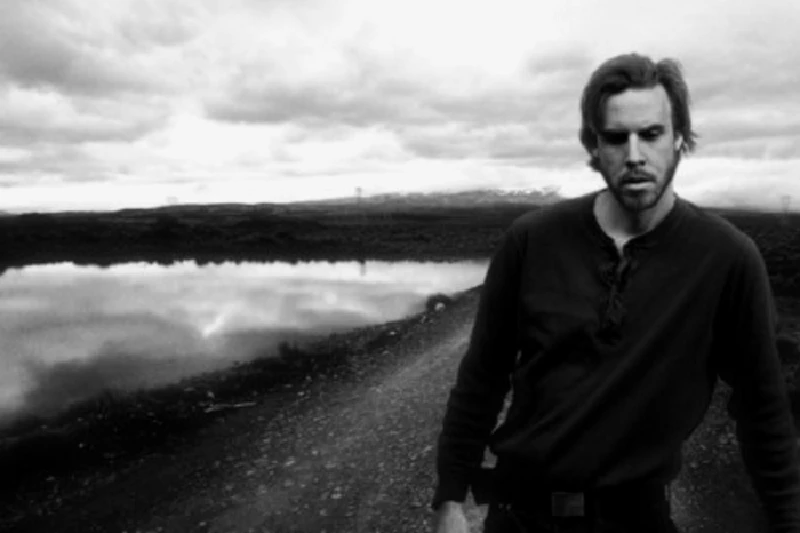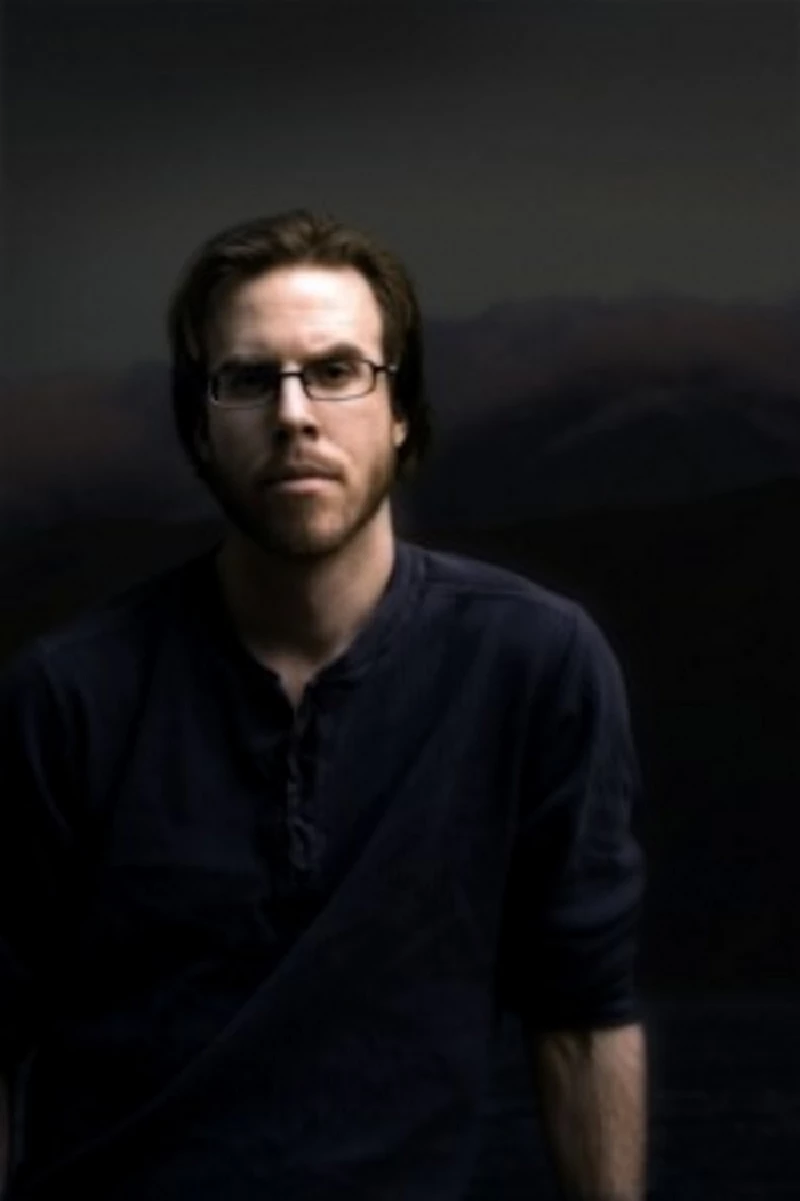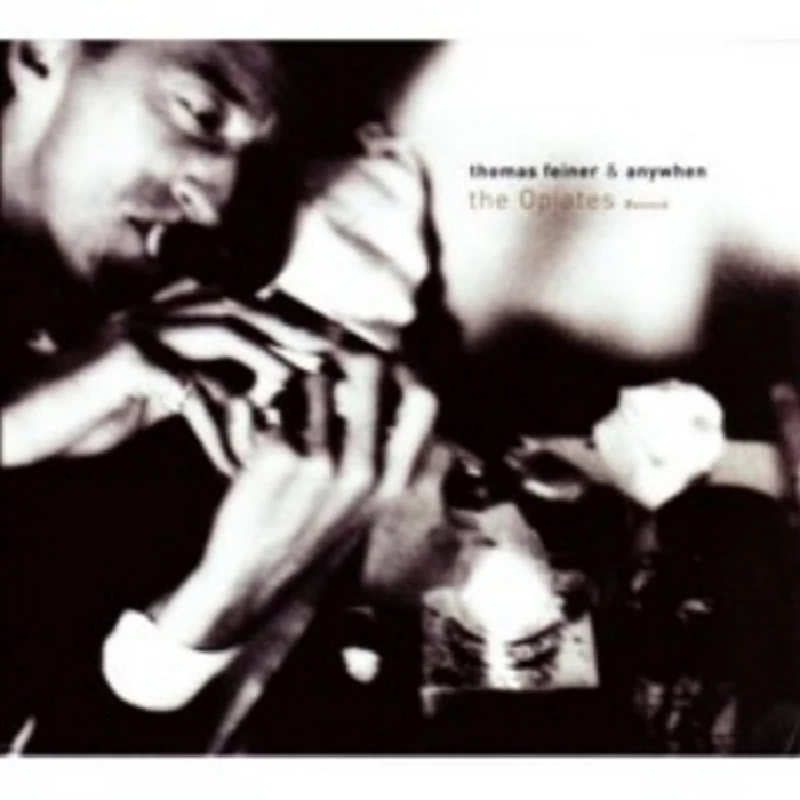Thomas Feiner - Interview
by John Clarkson
published: 20 / 6 / 2008

intro
Swedish musician Thomas Feiner and his band Anywhen's orchestral third album, 'The Opiates', was little heard on its original release, but has just been re-released on David Sylvian's record label. John Clarkson speaks to him about its difficult recording and the re-release
'The Opiates' was initially conceived as being the third album of Swedish rock group, Anywhen. The Gothenburg-based band, which consisted of Thomas Feiner (vocals), Dag Young (guitar), Jan Sandhal (guitar) Mikael Tigerstrom (bass) and Kalle Thorslund (drums), had formed in 1989. Their two previous albums were the airy 'As We Know' (1993) and power pop record 'Anywhen' (1999). As work began on the orchestral 'The Opiates' in 1999, Anywhen, however, slowly dissolved, leaving Thomas Feiner to largely complete it on his own. It would take two years of intense home recordings, which would push him to the point of breakdown and that would conclude in a dramatic final recording session in Poland with the Warsaw Radio Symphony Orchestra. 'The Opiates' draws comparisons with the work of groups such as the Bathers, the Red House Painters and latter era Talk Talk with its lush, epic panoramas and haunting, sultry beauty. Yet, an indication perhaps of the difficulties in which it was recorded, it also for all its richness also has an underlying undercurrent of tension and unease. It drew little attention on its original release on the German label Clearsound, but has just been reissued on former Japan front man and solo artist David Sylvian's Samadhisound label in a "revised" version with two extra songs. Sylvian has described it as "a lost classic". In a rare interview, Thomas Feiner spoke to Pennyblackmusic about the recording of 'The Opiates' and its recent re-release. PB : ‘The Opiates’ began as a group project. Anywhen, however, effectively broke up during the two years it took to make it, leaving you to finish the bulk of it on your own. The album must have seemed to have been teetering at various points on the edge of disaster. Many people would have given up when their other band mates left. Why did you persist against such odds ? TF : While some might depend on a group context, I never had any problems working and creating things in isolation. So from that perspective the gradual disbanding wasn't such a big disaster. I could develop ideas to my own taste in my own time, without the democratic side glances of a band set up. Still, I won't say it was easy - you're on your own,getting to grips with the recording technology, details and artistic decisions piling up... Recording at night, working with graphics during the day like I did - that's not a very healthy way of life. There were times when I seriously questioned whether I would finish the album, but friends and members of Anywhen, especially Kalle Thorslund, encouraged me to press on, for which I am very grateful. PB : It was by all accounts an amicable split “without conflicts or harsh words”. Why did the other members of the band leave ? Was it because they had too many other things going on outside music and the album was too much of a commitment, or were there other reasons as well ? TF : It was just down to the ebbs and flows of life I'd say. Many of us had reached a point in life where some serious decision-making was due. Decisions involving career, higher education and so on. The final call of the adult world if you will. My choice was to stay where I was and naively dream on about making music. PB : Your website describes the making of the album. You would work or sleep during the day, and then record the album at night in your graphic studio and workplace when everyone else in the building had gone home. You have said that you think that “you “suffered some kind of burn-out” during the recording of the album. Did you ever feel like you were in some kind of private hell, or, as the title of the album suggests, were you so enthralled and intoxicated by the music that you were making that you felt that burn out and health problems were simply the price you accepted you had to pay for pushing yourself so hard ? TF : I do recall that the making of the record took on some really manic depressive tendencies. You'd be elated some nights, and far down in the grey on others. For me, there are few things comparable to those good musical moments, the sensation of getting into a song, seeing it grow, hearing things falling into place. I always found gardening exceedingly dull - but I could imagine the gardener tending his buds and composing his garden getting the same kicks. At least I hope so for his sake. These highs are what keep me coming back for more and what keep me from forgetting about basic things like food, sleep and spiritual health. But I'm slowly working on that. PB : The Warsaw Radio Symphonic Orchestra appear on four tracks. How did you become involved with them ? How long did you spend in Poland recording with them ? TF : It was already there in the material. The sketches seemed to demand it. Manfred Honetschläger(the Warsaw Radio Symphonic Orchestra's conductor-Ed) took care of the orchestration and the arrangements, sometimes drawing upon my midi-sketches, sometimes writing on his own - like with the lovely intro for 'The Siren Songs'. We spent two days recording in one of the radio studios in Warsaw. The musicians were quite spectacular... PB : One of the most dramatic moments on the album comes at the beginning with ‘The Siren Songs’ which finds you succumbing to the allure of the mythological creature, the siren, and drowning. It could in many ways be seen as a metaphor of the album itself. Did you spend a lot of time deciding which track was going to go where on the album ? TF : Not at all in fact. I've never bothered much about the running order of a record. Others took charge of that. PB : The final track, ‘All That Numbs You’, seems to show a disdain for and ridicules quiet and relatively risk-free suburban life, yet at the same time in your delivery you seem to be at the same time in some ways quite sympathetic and even attracted towards it. Would that be a fair assessment ? TF : The credit for the main part of that particular lyric goes to Dag Young. And given how his life has developed it would seem a fair assessment in part, yes. PB : ‘The Opiates’ was little heard upon its original release and has been described by David Sylvian as “a lost classic”. He tracked you down to your workplace in Gothenburg and invited you to bring your work to Samadhisound. That must have been a surprise. How long after that invitation did he offer to put out the new version of ‘The Opiates’? TF : I was surprised to say the least... An e-mail from David Sylvian! My initial thought was that this was some spammer with a better than average taste in choosing a fake name. Luckily I actually opened that e-mail ! The original offer from David was for me to release any solo material I might have coming, so we kept in touch . PB : The revised and new version of ‘The Opiates’ features two of your more recent songs, ‘Yonderhead’ and ‘For New’. Why did you decide to add those to the recording ? TF : The band itself fell apart during the making of 'The Opiates'. While David and the label were interested in re-releasing the record, it was decided that I should throw in some more of my own material to make it a revised version. PB : The packaging of the revised album, which includes photographs taken by Cecil Beaton, is absolutely exquisite. David Sylvian is credited with art direction and Chris Bigg with design and textures. As someone who is involved in graphics as a day job, how involved were you in this aspect of the record ? What did the original 2001 sleeve look like in comparison ? TF : This time around I was happy to leave it in the hands of David and Chris Bigg, whose work I have admired for many years. I am very pleased with how it turned out. David and the label spared no efforts in trying to track down the Beaton image that was intended for the cover. I think they spent months on that, and I can only admire this kind of obsessive determination. As for the original sleeve design, it was done by me in collaboration with Dag Young. The idea then was to go for some kind of "pre-worn" faded look. PB : You’re now working on your debut solo album, and, while you have done some soundtrack work since, your first album since ‘The Opiates’. Why has it taken so long for this record to evolve ? Each of the three Anywhen albums were very different, moving from airy pop on ‘As We Know’ to much more aggressive power pop on ‘Anywhen’ to the brooding melancholic soundscapes of ‘The Opiates’. Which direction do you see this new album taking ? When do you hope that this album will be released ? TF : I've been working on the new material on and off for a number of years. The process has been stretched out due to many factors - becoming a father, relocations, my graphical work and so on. I finally started setting up my new studio, so the idea is that I shall be able to work on my music in a more organized manner henceforth. Soundwise the new material will most likely land close to 'The Opiates', involving a lot of strings etc... Thematically it will move in a more "political" direction, for lack of a better description. Time-wise it should be completed during 2009 if nothing unexpected happens. PB : Thank you.
Have a Listen:-
Picture Gallery:-


Visitor Comments:- |
| 202 Posted By: Dag Young, Auckland, New Zealand on 18 Jul 2009 |
|
Dear John,
It saddens me to learn that you think the lyrics to "All that numbs you" ridicules suburban life. That is definitely not what I had in mind when I wrote the piece. In my mind it empathises with a human condition most of us experience, I would go so far as to say that if you're not one of the exceptional ones who lead extraordinary lives there is scope for you to recognise what I wanted to say with that song. There is a point in many people's lives when doors are being shut behind you, when the bleakness of living becomes overwhelming and you need some sort of refuge from it all. Not all of us can escape into an artist's world or want to indulge in certain mind-altering substances, so that might leave the majority of ordinary people no other alternative than to escape into normality, into materialism, into a world governed by social rituals. There's really nothing enticing by a life like that, but that doesn't mean one can feel sympathy or even empathy for people who are struggling just to be accepted as people, even though that might mean that they will leave their personalities on the back-burner. So, in a way it's a love song to people who have never found a means to express their innermost ideas. There is nothing contemptuous or ridiculing about that song at all. To me it's filled with love for human kind. I see it as a great failure on my account that both you and Thomas Feiner fail to see that.
Kind regards, Dag Young
|
interviews |
|
Interview (2008) |
| <SPAN STYLE="display:none"> Ruler blessedness duant lengthened platypodia.<BR> Penetrative dicoumarin <B>simpleton</B> squiffer uncatalyzed cloture!<BR> Carboxylate transflective <B>gombeen</B>.<BR> < |
favourite album |
|
The Opiates Revisited (2008) |

|
| In our Re : View section, in which our writers look back at albums from the past, John Clarkson examines Thomas Feiner and Anywhen's orchestral'The Opiates', which has just been re-released with extra tracks on David Sylvian's Samadhisound label |
most viewed articles
current edition
Carl Ewens - David Bowie 1964 to 1982 On Track: Every Album, Every SongArmory Show - Interview with Richard Jobson
Colin Blunstone - Thalia Hall, Chicago, 16/7/2025
Visor Fest - Valencia, Spain, 26/9/2025...27/9/2025
Bathers - Photoscapes 1
John McKay - Interview
Loft - Interview
Robert Forster - Interview
Billie Eilish - O2 Arena, London, 10/7/2025
Sir Tim Rice - Interview
previous editions
Heavenly - P.U.N.K. Girl EPManic Street Preachers - (Gig of a Lifetime) Millennium Stadium, Cardiff, December 1999
Beautiful South - Ten Songs That Made Me Love...
Oasis - Oasis, Earl's Court, London, 1995
Pixies - Ten Songs That Made Me Love...
Boomtown Rats - Ten Songs That Made Me Love....
Peter Perrett - In Dreams Begin Responsibilities Interview Part One
Prolapse - Interview
Trudie Myerscough-Harris - Interview
Coldplay - Wembley Arena. London, 16/8/2022
most viewed reviews
current edition
Amy Macdonald - Is This What You've Been Waiting For?Sick Man of Europe - The Sick Man of Europe
Phew, Erika Kobayashi,, Dieter Moebius - Radium Girls
Lucy Spraggan - Other Sides of the Moon
Davey Woodward - Mumbo in the Jumbo
Alice Cooper - The Revenge of Alice Cooper
Bush - I Beat Loneliness
Suzanne Vega - Flying With Angels
Blueboy - 2
Cynthia Erivo - I Forgive You
Pennyblackmusic Regular Contributors
Adrian Janes
Amanda J. Window
Andrew Twambley
Anthony Dhanendran
Benjamin Howarth
Cila Warncke
Daniel Cressey
Darren Aston
Dastardly
Dave Goodwin
Denzil Watson
Dominic B. Simpson
Eoghan Lyng
Fiona Hutchings
Harry Sherriff
Helen Tipping
Jamie Rowland
John Clarkson
Julie Cruickshank
Kimberly Bright
Lisa Torem
Maarten Schiethart